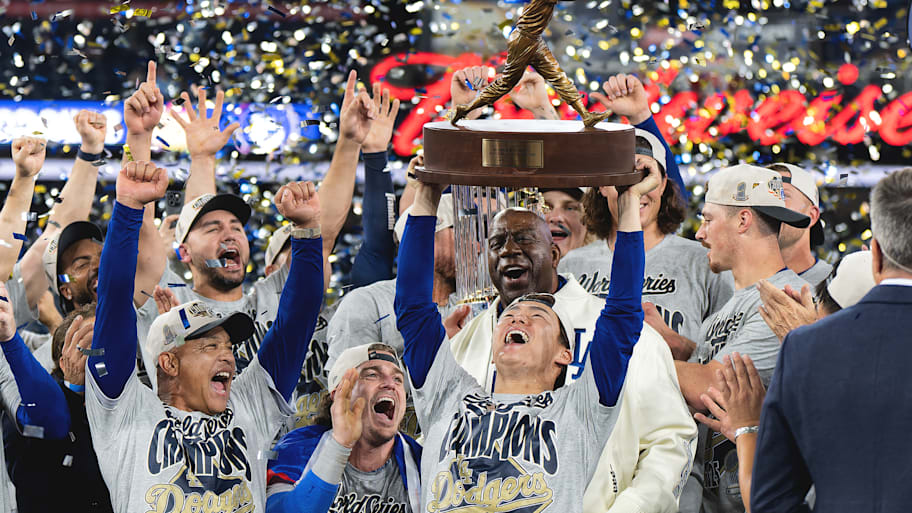The 2025 Dodgers may be remembered as one of the most talented teams in MLB history. With four former MVPs and a pair of Cy Young winners among its ranks—not to mention World Series MVP Yoshinobu Yamamoto, the highest-paid pitcher in MLB history—Los Angeles was fittingly home to a star-studded roster. That being said, can this year’s squad claim to be the best in team history? It’s a fierce competition considering the franchise’s rich history.
By winning three World Series titles in the last six years, giving the franchise nine total championships, the Dodgers now find themselves tied with the Athletics and Red Sox for the third-most World Series wins, trailing only the Yankees’ 27 and the Cardinals’ 11. Those nine titles span 70 years and have been split among three managers, with Dave Roberts now a lock to join Walter Alston and Tommy Lasorda in the Hall of Fame one day.
The Dodgers’ latest triumph presents a prime opportunity to compare those nine World Series-winning teams. As in Sports Illustrated’s ranking of this century’s champions, statistical factors as well as intangibles were considered. If this decade’s results have been any indication, we might have to update these rankings awfully soon.
9. 1959 Los Angeles Dodgers (88–68)
Pythagorean record: 82–74 | Playoff record: 4–2
Runs scored (MLB rank): 705 (6th) | Runs allowed (rank): 670 (7th)
Manager: Walter Alston
World Series MVP: Larry Sherry | Other key players: Don Drysdale, Duke Snider, Wally Moon
Los Angeles was quite lucky to host the World Series for the first time—its run differential was third-best in the NL, barely better than that of the 74–88 Reds—but the Dodgers proved themselves as giant killers. After tying the Milwaukee Braves for the best record in the NL, they swept them in a playoff, taking down a team that boasted future Hall of Famers Hank Aaron, Eddie Mathews and Warren Spahn. Then, after losing Game 1 of the World Series by an 11–0 score, they recovered to defeat the White Sox, who had MLB Cy Young winner Early Wynn—back when there was just one trophy given to the majors’ best pitcher—AL MVP Nellie Fox and AL MVP runner-up Luis Aparicio (all of them also being future Hall of Famers).
Sherry may have just been a rookie, but this World Series marked the peak of his career. The 24-year-old reliever remarkably recorded two wins and two saves against the White Sox while recording a 0.71 ERA in 12 ⅔ innings (including the final 5 ⅔ innings of the series) to earn series MVP honors.
8. 1988 Los Angeles Dodgers (94-67-1)
Pythagorean record: 91–70 | Playoff record: 8–5
Runs scored (MLB rank): 628 (19th) | Runs allowed (rank): 544 (2nd)
Manager: Tommy Lasorda
World Series MVP: Orel Hershiser | Other key players: Kirk Gibson, Tim Leary, Tim Belcher
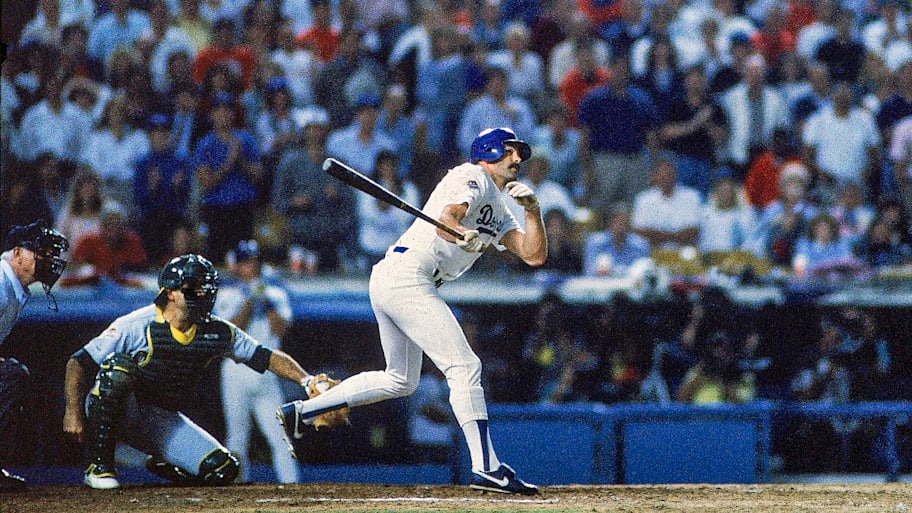
These Dodgers weren’t favored in either of their playoff series, but they pulled out a seven-game victory over the Mets in the NLCS and a five-game Fall Classic win over the A’s thanks to heroic performances from the NL Cy Young winner in Hershiser and the NL MVP in Gibson. That was a continuation of what had occurred for most of the year—righty starter Leary was the only other player who produced even 3.0 WAR during the regular season.
Gibson’s walk-off home run on two injured legs in Game 1 of the World Series is the most enduring image of this team, but Hershiser has a strong argument for being even more invaluable than his teammate. This was famously the season in which Hershiser recorded 59 consecutive scoreless innings, a record that still stands. He also started three games in the NLCS, shutting out the Mets in Game 7 after also earning the save in Game 4. The 30-year-old then shut out the A’s in Game 2 of the World Series before closing it out with a complete game in Game 5. It’s no wonder why the three-time NL innings leader became the first player to undergo shoulder reconstruction surgery in 1990.
7. 1981 Los Angeles Dodgers (63–47)
Pythagorean record: 67–43 | Playoff record: 10–6
Runs scored (MLB rank): 450 (10th) | Runs allowed (rank): 356 (3rd)
Manager: Tommy Lasorda
World Series MVPs: Ron Cey, Pedro Guerrero, Steve Yeager | Other key players: Fernando Valenzuela, Jerry Reuss, Burt Hooton, Dusty Baker
The 1981 season was shortened by a midseason players’ strike that lasted from June 12 to July 31, splitting the season into two halves. The Dodgers earned their spot in the playoffs by leading the NL West by a mere half-game over the Reds when the strike began; they then played the division’s second-half champions, the Astros, in the first-ever division series round despite finishing fourth in the NL West in the second half.
One commonality that spanned the two halves was Fernandomania. The phenomenon named after Valenzuela, the eventual Rookie of the Year and Cy Young winner with an MLB-high 180 strikeouts and eight shutouts, carried all the way to the World Series.
There were zero Hall of Fame players on this roster, but the well-balanced Dodgers managed to prevail in the NLCS over the Expos, who were led by future Cooperstown inductees Andre Dawson, Gary Carter and Tim Raines. They did the same in a six-game Fall Classic over a Yankees squad featuring Goose Gossage and Reggie Jackson. After losing the first two games in New York, Los Angeles gutted out three consecutive one-run wins at home before finishing the job with a 9–2 rout at Yankee Stadium.
6. 1965 Los Angeles Dodgers (97–65)
Pythagorean record: 92–70 | Playoff record: 4–3
Runs scored (MLB rank): 608 (15th) | Runs allowed (rank): 521 (1st)
Manager: Walter Alston
World Series MVP: Sandy Koufax | Other key players: Don Drysdale, Maury Wills, Jim Lefebvre
This was the last of Alston’s four championships with the Dodgers, all of which were won in the span of 11 seasons. The 1965 Dodgers were spectacular at preventing runs; they allowed 34 fewer than any other team. Even in an era known for dominant starting pitchers, L.A.’s rotation stood out with three hurlers who combined for 931 innings and all logged ERAs under 2.80. The best of them was Koufax, who put forth his most prolific season before he unsurprisingly retired two years later due to arthritis in his elbow.
The 29-year-old lefthander won 26 games, recorded a 2.04 ERA and racked up a preposterous 382 strikeouts in 335 ⅔ innings. No one had struck out more batters since 1886 and only one player (Nolan Ryan, 383 in 1973) has since matched that output. Koufax went on to pitch in three World Series games against the Twins, tossing shutouts in Games 5 and 7—the latter on two days’ rest—to bring home the title.
Wills, a two-time Gold Glove winner at shortstop, finished third in NL MVP voting (directly behind Koufax and two spots ahead of Drysdale) after leading the majors with 94 stolen bases. Los Angeles’s offense otherwise left a lot to be desired, as no player hit more than 12 home runs. It didn’t matter with Koufax leading the way.
5. 1963 Los Angeles Dodgers (99-63-1)
Pythagorean record: 92–70 | Playoff record: 4–0
Runs scored (MLB rank): 640 (12th) | Runs allowed (rank): 550 (3rd)
Manager: Walter Alston
World Series MVP: Sandy Koufax | Other key players: Don Drysdale, Jim Gilliam, Tommy Davis, Ron Perranoski
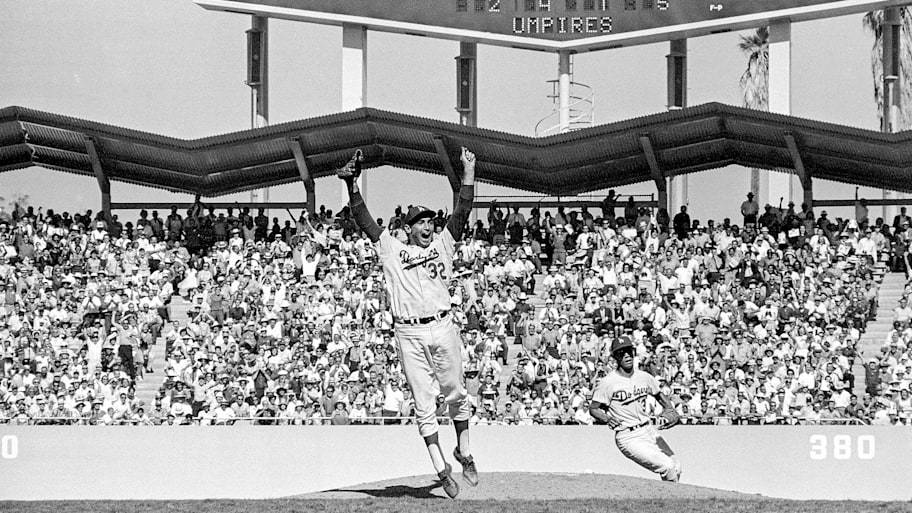
Koufax earned his lone MVP award in 1963 to kick off perhaps the best four-year run by any pitcher to ever toe the rubber. To win the first of his three Cy Young awards as well as the first of three pitching triple crowns, he recorded 25 wins, a 1.88 ERA and 306 strikeouts in 311 innings.
While the future Hall of Famer had some more help from his offense on this team, this was still undoubtedly a squad reliant on its pitching—a fact reinforced by a World Series in which the Dodgers gave up just four runs in four games. The Yankees never held a lead at any point in the series as Los Angeles dealt New York its first ever World Series sweep. This oddly remains as the only championship the Dodgers have clinched in their home ballpark.
4. 2024 Los Angeles Dodgers (98–64)
Pythagorean record: 96–66 | Playoff record: 11–5
Runs scored (MLB rank): 842 (2nd) | Runs allowed (rank): 686 (13th)
Manager: Dave Roberts
World Series MVP: Freddie Freeman | Other key players: Shohei Ohtani, Mookie Betts, Yoshinobu Yamamoto
Entering 2024, the Dodgers had yet to win a title in a full season during a decade-plus run of regular season dominance. Los Angeles left no doubt about its playoff bona fides this time around, staving off elimination twice by winning the final two games of the NLDS against the rival Padres, then winning eight of 11 against MLB’s two New York teams. The highlight, of course, was the first walk-off grand slam in World Series history, courtesy of Freeman in Game 1. L.A. also overcame deficits of 5–0 and 6–5 in the decisive Game 5.
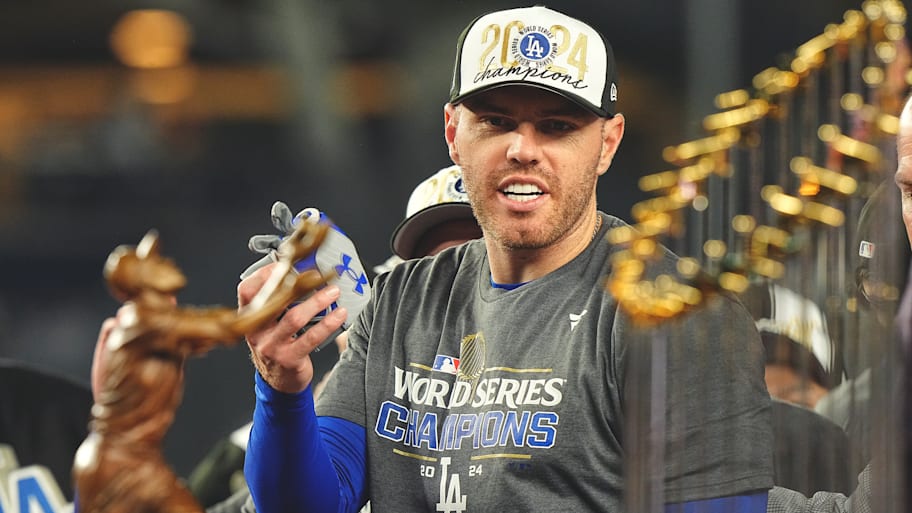
Ohtani couldn’t pitch in his first season as a Dodger due to an elbow injury, but he made up for it with his best year at the plate—he led the NL in home runs (54), runs (134), RBIs (130), on-base percentage (.390) and WAR (9.2)—to win his third MVP award in four seasons. He was far from L.A.’s only offensive weapon as one of five All-Star hitters, with eight of the Dodgers’ top 10 batters registering as league-average or better.
That made up for an injury-ravaged pitching staff that could muster only two quality starts in 16 postseason games. If you want to amuse your friends with a trivia question, ask them who led the 2024 Dodgers in innings pitched. The answer: Gavin Stone, a rookie who hurled 140 ⅓ innings before succumbing to a shoulder injury in September.
3. 2025 Los Angeles Dodgers (93–69)
Pythagorean record: 95–67 | Playoff record: 13–4
Runs scored (MLB rank): 825 (2nd) | Runs allowed (rank): 683 (12th)
Manager: Dave Roberts
World Series MVP: Yoshinobu Yamamoto | Other key players: Shohei Ohtani, Will Smith, Freddie Freeman
The Dodgers cemented their status as a dynasty by winning their third title in six years, doing so by the skin of their teeth with their backs up against the wall in Games 6 and 7 of the World Series.
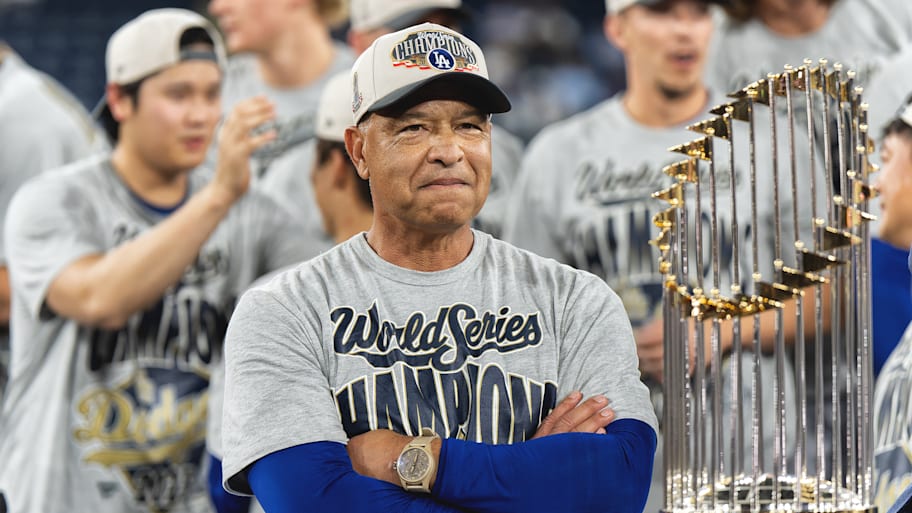
It was difficult to differentiate this team from the one that preceded it; their offensive and defensive stats are remarkably similar. The biggest contrast lies in the makeup of the pitching staff; while the 2024 Dodgers relied upon its bullpen to advance through longer playoff series in the absence of enough dependable starters, the 2025 edition leaned on starters Yamamoto, Ohtani, Blake Snell and Tyler Glasnow to carry them through the postseason.
The result was a team that, once at full health, marched through the NL bracket with a 9–1 record—including a sweep of the Brewers, who recorded MLB’s best regular-season record—before getting pushed to the limit by the Blue Jays in the World Series. The presence of Snell and a healthy Ohtani on the mound gives the 2025 Dodgers the edge over their predecessors.
WON IT ALL. #WORLDSERIES pic.twitter.com/rYb9LEi5Pn
— Los Angeles Dodgers (@Dodgers) November 2, 2025
2. 2020 Los Angeles Dodgers (43–17)
Pythagorean record: 43–17 | Playoff record: 13–5
Runs scored (MLB rank): 349 (1st) | Runs allowed (rank): 213 (2nd)
Manager: Dave Roberts
World Series MVP: Corey Seager | Other key players: Mookie Betts, Clayton Kershaw, Justin Turner
The 2020 Dodgers ranked below their 2024 compatriots in our 21st century World Series champion rankings, which were decided by a three-person panel. But this is a one-man job, and I think these shortened-season champs were underrated in that exercise. I’ll let my colleague Nick Selbe take over here via his contribution to that piece, as I couldn’t have said it better myself:
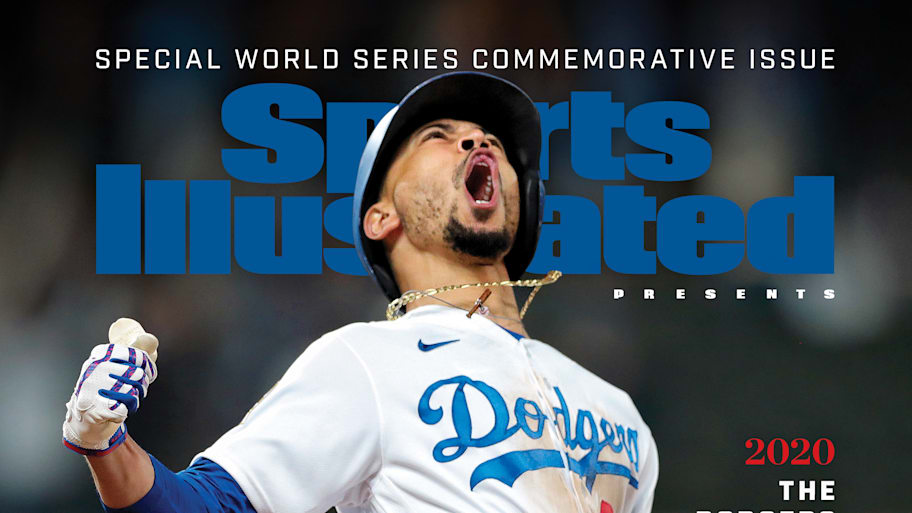
The forgotten champions from a pandemic-shortened season don’t get nearly enough credit for achieving the franchise’s first title since 1988, and as a result aren’t mentioned among the all-time great teams. But these Dodgers didn’t just fluke into a championship by virtue of a 60-game regular season and an expanded 16-team playoff field—they won in spite of these conditions. Los Angeles’s +136 run differential was 52 runs better than any other team from this season (it’s also better than 11 full-season champs from this century).
Entering the postseason on a 116-win full-season pace, the Dodgers had to navigate four playoff rounds without the benefit of a home-field advantage, highlighted by coming back from a 3–1 NLCS deficit against the Braves. This was also the year the postseason Clayton Kershaw narrative was put to bed: The future Hall of Famer, who struggled in previous playoff runs, posted a 2.91 ERA in five postseason starts, including two wins in the World Series.
1. 1955 Brooklyn Dodgers (98-55-1)
Pythagorean record: 95–58 | Playoff record: 4–3
Runs scored (MLB rank): 857 (1st) | Runs allowed (rank): 650 (4th)
Manager: Walter Alston
World Series MVP: Johnny Podres | Other key players: Roy Campanella, Duke Snider, Don Newcombe, Gil Hodges
The Dodgers’ first ever World Series team remains its greatest—and will be hard to top. In the franchise’s third-to-last season before moving to Los Angeles, it boasted a whopping six future Hall of Famers on the roster—Jackie Robinson, Roy Campanella, Sandy Koufax, Gil Hodges, Duke Snider and Pee Wee Reese—as well as HOF manager Walt Alston in the first of his four titles.
Brooklyn led the standings wire-to-wire before winning its title, becoming the first team since the 1927 Yankees to do so. It scored 82 more runs and allowed 16 fewer than any other NL team. Campanella won his third MVP in five years (though it was probably meant to go to teammate and runner-up Snider, who led MLB with 126 runs and 136 RBIs, only for a bizarre voting mishap to hand it to Campanella). Newcombe became the first Black pitcher to win 20 games and led the majors with a 3.76 K/BB ratio and 1.5 walks per nine to go along with his 3.20 ERA. He also very well may have won the Cy Young award, but it was not introduced into the following year, as its namesake passed in 1955 before the individual honor was introduced in 1956.
A 22-year-old Podres pitched two complete games in the World Series, including a shutout of the Yankees in Game 7, to claim series MVP honors and help Brooklyn beat its crosstown rivals in the Fall Classic for the first time after losing to them four times in the previous eight years.
More World Series Coverage
This article was originally published on www.si.com as Ranking the Dodgers’ Nine World Series-Winning Teams.
